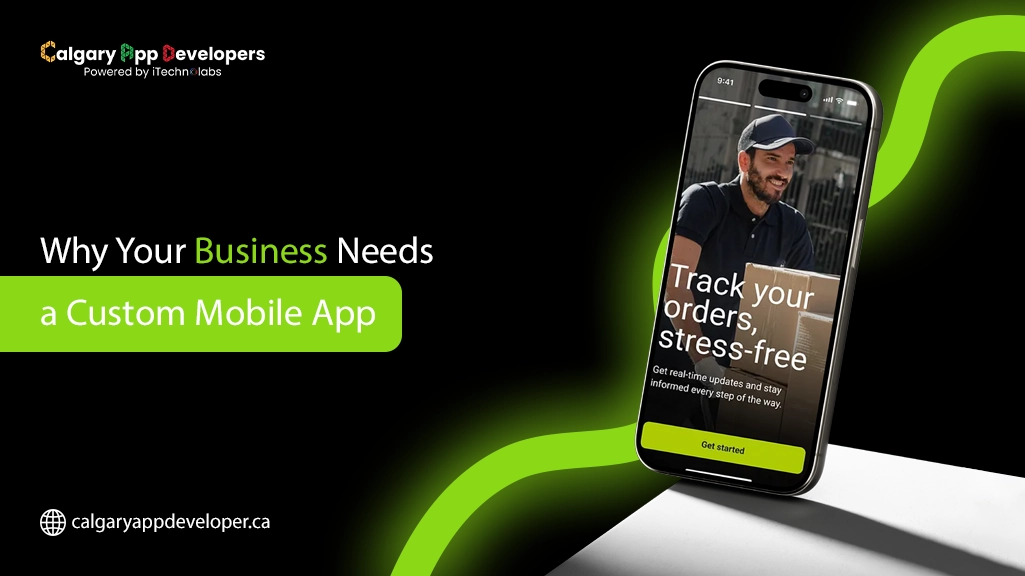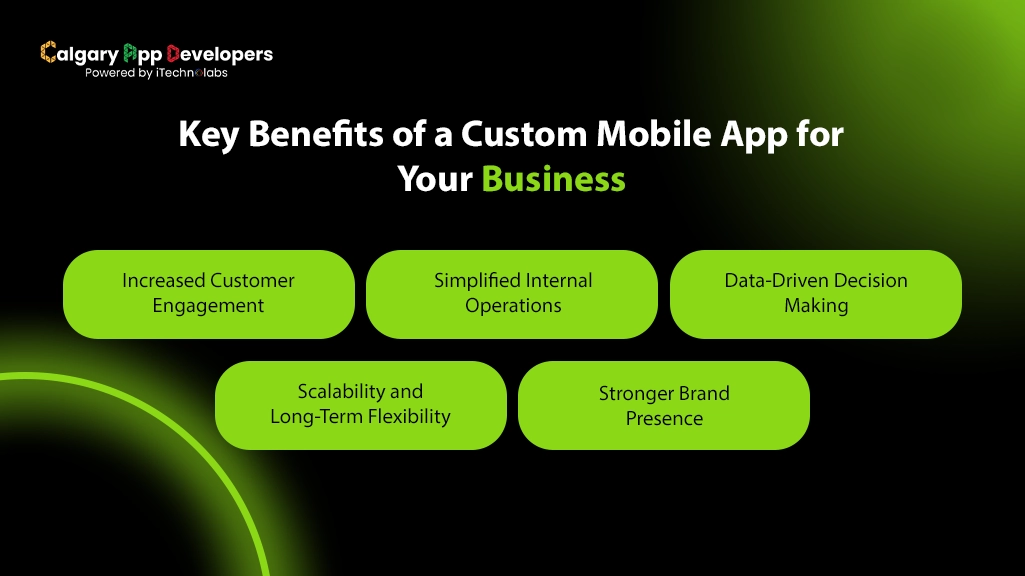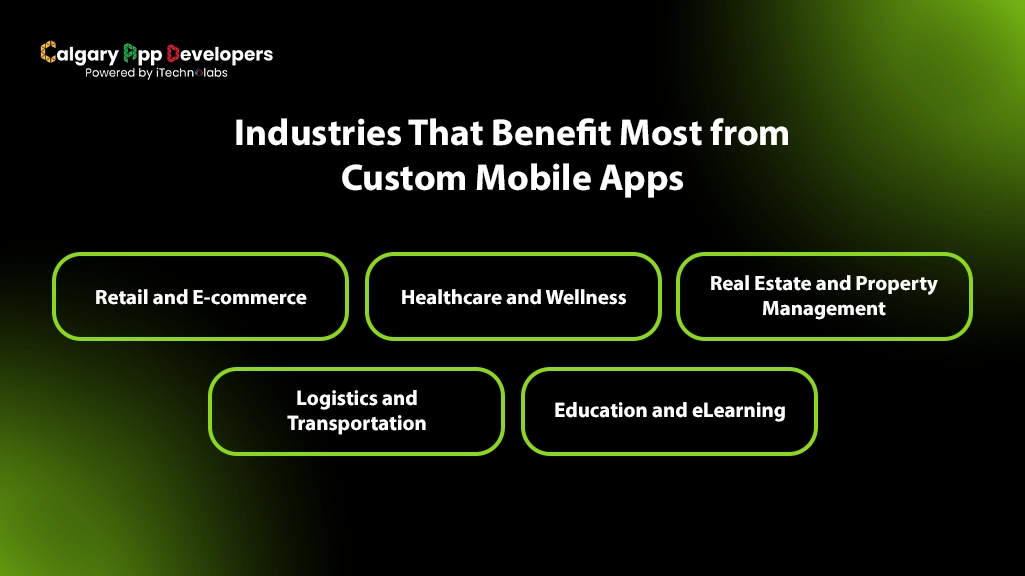Why Your Business Needs a Custom Mobile App

Imagine this: You stand in line for coffee, and in those two brief minutes, you take a peek at your bank account, order groceries, and schedule a client meeting—all via mobile apps. Now turn the tables: how often do your customers wish they could do the same for your business?
We live in a swipe-first universe. Your customers are always on the move, and if your company is not in their pocket, it may not be on their radar.
In fact, in a 2025 report by Grand View Research, the market for custom software development—counting mobile apps—is expected to rise from $43.16 billion in 2024 to $52.84 billion in 2025, with further growth anticipated through 2030. This isn’t a fleeting fad—it’s a strong indication that companies globally are leaving their generic solutions behind and opting for solutions customized to their requirements.
A mobile app built to order is not merely another technology asset. It’s your brand, your business, and your value—wrapped up for the very individuals who need it, when they need it.
In this blog, we’ll break down why investing in a custom mobile app might be one of the smartest moves your business can make right now.
Why a Custom App Beats Off-the-Shelf Solutions
Eventually, every enterprise interested in developing a mobile presence poses the same question:
Do we develop something custom or purchase an off-the-shelf solution?
Off-the-shelf solutions may be appealing. They’re quicker to deploy and appear less expensive initially. But often, the long-term constraints are ignored—inflexible features, generic user experience, constrained scalability, and vendor lock-in.
A custom mobile app, however, is designed from scratch to meet your business, your customers, and your expansion. Let’s dissect why that’s important—and how going custom will lead to long-term success.
- Tailored to Your Business—Not the Masses
Off-The-Shelf apps are created to address the widest user demographic. This is what makes them generic in their features, user flows, and designs. When using COTS software, the expectation is that you will adapt your business processes to use the tool—and not the other way around.
Custom apps change this narrative.
Custom applications are utilized in the exact process your business operates in—be it bookings, deliveries, inventory management, or customer onboarding. Every screen, interaction, and functionality is custom designed to maximize your internal operations and customers’ experiences.
- Scales With Your Growth (Instead of Holding It Back)
When you’re on third-party platforms, you’re beholden to their product roadmap. Need to add a special feature that makes you competitive? No way. Need support for an additional user type or integration? You’re at the mercy of the platform providers.
A custom mobile app expands as your business expands.
You can be lean and add functionality down the line—without having to rebuild from scratch. It becomes a living asset, changing to meet altering customer expectations, shifts in the market, or operational changes.
- Full Control Over Data & Security
With off-the-shelf products, you’re leaving your user data, payments, and possibly sensitive business data to someone else’s infrastructure. You’re also dependent on their security practices, which might not be what your industry demands.
Custom development provides you with end-to-end data handling and security architecture control. You can have strong security practices from day one—two-factor authentication, encryption, GDPR/CCPA compliance, and so forth—customized to your risk tolerance and compliance requirements.
- Deep Integration With Your Existing Tools
Nobody likes having to juggle five isolated systems. That’s what usually happens when you bolt a generic app onto a technology stack it wasn’t intended for, though.
Custom mobile applications are created with the ability to interface with your systems—CRM, ERP, accounting software, marketing automation, etc. If you want real-time data syncing, automation of workflows, or just to aggregate analytics—all of it is easy when the app can interface through integration.
- Brand-Driven Experience That Customers Actually Enjoy
Why Remember an App? People remember the apps that were “delightful.” People remember apps that felt easy, felt natural, and aligned with the brand they trust.
You rarely get deep customizations for user interface (UI) or user experience (UX) with off-the-shelf platforms. They usually come with standard layouts, cumbersome navigation, and branding that “almost” feels right.
A custom app allows you the opportunity to create a delightful experience from logo to language and interactions to visual aesthetics. That level of finishing polish can result in a more satisfied user, better app reviews, and greater retention.
- More Cost-Effective Over Time
There’s no denying that a custom mobile app requires a higher upfront investment. But look closer at the long-term economics.
With off-the-shelf applications, you typically continue to pay ongoing license, user, and/or upgrade fees, not to mention you could be spending money on third-party add-ons just to overcome your functionality shortcomings. Those fees add up over time—and you are still using an off-the-shelf application that does not meet your needs.
With a custom app, you own the code. No ongoing licensing fees. No unnecessary features you’re forced to pay for. Just a focused, purpose-built tool that continues to deliver ROI for years.
Also Check: Top Mobile App Development Platforms
Key Benefits of a Custom Mobile App for Your Business

A custom mobile application isn’t merely a digital utility—it’s a customized answer meant to address specific business problems and create new possibilities. From enhancing customer relationships to streamlining operations, these are five fundamental advantages a custom mobile application delivers:
- Increased Customer Engagement
- Custom apps are designed with your unique audience in mind, intuitive and personalized to the user experience.
- Push notifications, in-app messaging, and tailored content keep you talking with your users continuously.
- You can completely control how, when, and why you engage with your customers—building more intense relationships and brand loyalty.
- Your users are more engaged with your business when their app experience is meaningful, effortless, and satisfying.
- The outcome is greater involvement, increased retention rates, and improved lifetime value per customer.
- Simplified Internal Operations
- Custom mobile apps can also digitize and automate numerous business functions, minimizing labor-intensive tasks and operational bottlenecks.
- Real-time data synchronization, task administration, and centralized workflows can notably enhance team productivity.
- By aligning the app with how your teams truly work, you are removing workarounds or numerous disconnected tools.
- Processes become more efficient and reliable, enhancing both internal productivity and service quality.
- Less administrative overload means more time for high-value tasks and less on routine ones.
- Data-Driven Decision Making
- An application can be developed specifically with analytics and tracking features built in from the beginning.
- You have access to rich insights into user behavior, feature adoption, session length, and more—aligned directly with your KPIs.
- This information arms you to make data-driven decisions on marketing, product roadmap, and customer support.
- Unlike generic software, you decide what to measure and how to represent it, with metrics specific to your objectives.
- Long term, this ongoing feedback cycle enables you to hone your app and business strategy for improved results.
- Scalability and Long-Term Flexibility
- A custom app is built to grow with your business—whether you’re bringing on more users, new features, or markets.
- There are no platform lockdowns or licensing constraints; you can modify and extend the app at will.
- You can develop in modules, releasing a core product initially and adding new capabilities over time as your requirements expand.
- Your app stays tied to your strategic vision instead of being held back by third-party development roadmaps.
- This adaptability makes your investment worth it and usable in the long term, even though your business evolves.
- Stronger Brand Presence
- Your app becomes an extension of your brand—custom-designed with your look, tone, and values in mind.
- Each interaction within the app reinforces your brand identity, building trust and recognition.
- A unified digital experience sets your business apart in a saturated market and leaves a lasting impact.
- In contrast to white-label offerings, you get complete creative control to craft the experience your fans desire.
- A bespoke app enables brand cohesion across touchpoints, which establishes trust and makes your business memorable.
Also Read: Top App Development Trends in North America
Industries That Benefit Most from Custom Mobile Apps

Though almost all businesses can reap the rewards of mobile presence, certain industries derive maximum value from a custom-developed app. From optimizing business processes to improving customer experience, mobile apps designed for industry requirements usually yield tangible growth.
Let us look at five industries where custom mobile apps have seriously made a difference—with live examples.
- Retail and E-commerce
More and more retailers are adopting bespoke apps to encourage more direct interactions, reduce cart abandonment, and drive repeat purchases. Businesses can create deeper connections with customers through personalized experiences, seamless checkout flows, and built-in loyalty programs.
- Example: A fashion clothing brand based in Toronto, Ontario, saw 40% higher customer retention after launching a bespoke app that allowed users to pre-shop collections and receive customized push notifications.
- Why It Works: A bespoke mobile app enables retailers to bypass the limitations of third-party apps, offering total control over user experience, promotions, and data capture.
- Healthcare and Wellness
Healthcare mobile applications provide both providers and patients with more options. From secure messaging and telemedicine visits to appointment reminders and electronic prescriptions, tailored apps improve access, communication, and ultimately trust.
- Example: A Southeast Asian wellness clinic launched a bespoke app that enabled patients to monitor progress, schedule bookings, and get updates on treatment—all in a safe space that was developed specifically for their care programs.
- Why It Works: By framing the app within its singular workflows and client care program, the clinic enhanced both operational effectiveness and patient engagement, resulting in improved outcomes and satisfaction.
- Real Estate and Property Management
Real estate agents and property managers take advantage of a mobile tool that allows prompt communication, access to listings, virtual tours, and scheduling. Tenants and customers have an enhanced, faster, more open experience.
- Example: A Calgary property management firm implemented custom app development Calgary to streamline rent payment and maintenance requests for multi-unit dwellings. The outcome? A 70% decrease in service response times and fewer delays in payments.
- Why It Works: Real estate companies require location-based functionality, from zoning information to rental regulations. A custom app can include these features and provide a local experience that a generic platform just can’t.
- Logistics and Transportation
Fleet management, deliveries, and driver schedules demand precision—and custom mobile apps provide that transparency to all stakeholders. From routing optimization to live tracking, the proper tools avoid delays, save money, and enhance accountability.
- Example: A European logistics company created a bespoke logistics app to dispatch operations, track driver activity, and offer real-time delivery updates across several regions.
- Why It Works: Having all operations consolidated in a single mobile platform enabled the business to cut out delays, lower fuel expenses, and enhance customer transparency—none of which could have been achieved with an ordinary third-party solution.
- Education and eLearning
For training providers and institutions, mobile-first learning spaces enhance accessibility, engagement, and performance monitoring. Custom apps enable anything from self-directed learning to real-time collaboration.
- Example: A vocational training college in London steered away from a legacy web portal and used a custom app to consider replacing it. By leveraging offline access, app push notifications and real-time grading, course completion rates improved in excess of 25%.
- Why It Works: Compared to static LMS systems, a custom app gives educators full control over how students view content, whether they progress at their own pace, and the type of screen learners utilize, creating a more modern and personalized learning experience.
Read Also: The Future of Mobile App Development in Western Canada
Custom App Features That Drive Results
A successful mobile app isn’t just about having the right idea—it’s about executing it with features that solve problems, create value, and make users want to come back. The real power of a custom app lies in its ability to deliver exactly what your business and your users need—no more, no less.
Here are five core features that consistently drive strong results across industries:
- Personalized User Experience
Custom apps allow you to tailor the experience based on user behavior, preferences, and history. From customized dashboards to relevant content recommendations, the app becomes more useful the more it learns.
When users feel like the app “knows” them, engagement naturally improves. Personalized experiences lead to longer sessions, better conversions, and stronger brand loyalty.
- Push Notifications with Context
Unlike mass email or SMS blasts, in-app push notifications can be highly targeted and time-sensitive. Whether it’s a reminder, a new offer, or an activity update, these messages are delivered directly when they’re most likely to be seen and acted on.
Done right, push notifications increase user retention and re-engagement without being intrusive. They create timely touchpoints that feel relevant instead of random.
- Offline Functionality
Custom apps can be built to work even when users don’t have a reliable internet connection. Whether it’s saving form data, caching content, or queuing actions to sync later, offline support ensures the app stays useful in real-world situations.
Users don’t always have perfect connectivity. Offline access builds trust, reduces frustration, and makes the app dependable—especially for field workers, travelers, or users in remote areas.
- Integration with Internal Systems
A key advantage of custom development is seamless integration with the tools your business already uses—CRM, ERP, payment gateways, analytics platforms, and more. Data flows smoothly across your ecosystem without extra effort.
Centralized systems save time, reduce errors, and empower your team to make faster, more informed decisions. It also creates a better experience for customers who interact with you across multiple channels.
- Scalable Architecture and Modular Features
A well-structured custom app can start small and grow over time. Modular development allows you to add new features, user types, or service areas without overhauling the entire system.
Your business won’t stay the same forever. With a scalable, flexible foundation, your app evolves as you do—supporting long-term goals without constant reinvention.
Also Check: Top App Development Companies in Canada
Common Myths About Custom Mobile App Development
Custom mobile app development has earned a reputation for being powerful—but also intimidating. Somewhere between budget concerns and development timelines, a lot of myths have surfaced. These misconceptions often keep businesses from exploring a solution that could actually solve their biggest pain points.
Let’s break down some of the most common myths—and what the reality really looks like.
Myth 1: “It’s Only for Big Companies”
Reality: Custom apps are scalable and can be built to fit any size business—whether you’re a local startup, a mid-sized service provider, or a national brand. You don’t need thousands of users or a massive team to benefit from something tailored.
Insight: Custom development isn’t about company size—it’s about company fit. If off-the-shelf tools aren’t meeting your needs, it might be time to build something that does.
Myth 2: “It’s Too Expensive”
Reality: While custom development can have a higher upfront cost, it often saves money in the long run by eliminating subscription fees, workarounds, and inefficiencies tied to generic software. More importantly, you’re investing in something you own.
Insight: Think of it like leasing versus owning property. One might seem cheaper monthly, but the other builds long-term value.
Myth 3: “It Takes Too Long to Build”
Reality: With agile development practices and modern frameworks, custom apps can be built quickly—especially when focused on core features first. Most businesses don’t need a complex product to launch, just the right version to start with.
Insight: You can go live with a focused MVP (Minimum Viable Product) in weeks—not years—and build from there based on real user feedback.
Myth 4: “We Can Just Use a Website”
Reality: While websites are essential, they don’t replace the unique benefits of a mobile app. Apps offer better speed, offline access, device integrations (like camera, GPS, and push notifications), and a smoother experience overall.
Insight: Mobile apps are built for depth of engagement, while websites are built for breadth. Both have a place—but they serve different roles in your digital strategy.
Myth 5: “Maintaining a Custom App Is a Headache”
Reality: With proper planning, ongoing support, and a clear update strategy, maintaining a custom app is no more difficult than managing any other digital asset. In fact, it’s easier when you control the roadmap.
Insight: A well-maintained custom app gives you freedom—freedom to fix issues fast, update features when needed, and grow without waiting on a third-party provider’s schedule.
Suggested: 10 Must-Ask Questions Before Choosing a Development Firm
Conclusion
In a world where user expectations are higher than ever, a custom mobile app is no longer a luxury—it’s a strategic advantage. It allows your business to deliver exactly what your customers need, streamline your internal operations, and grow on your own terms. While off-the-shelf solutions may seem convenient, they often create more limitations than they solve.
Custom mobile apps offer flexibility, scalability, and long-term value that generic platforms simply can’t match. And with growing access to skilled partners—like those offering custom app development in Calgary—building a solution tailored to your goals has never been more achievable.
If you’re serious about future-proofing your business, a custom mobile app isn’t just a smart investment—it’s the next logical step.

Pankaj Arora
Founder, Calgary App Developers
Pankaj Arora is a seasoned technology leader and the Founder of Calgary App Developers, with 7+ years of expertise in crafting high-performance digital solutions. His core competencies include full-stack app development, cloud-native architecture, API integration, and agile product delivery. Under his leadership, Calgary App Developers has empowered startups and enterprises alike with scalable mobile applications, secure web platforms, and AI-driven SaaS products.






